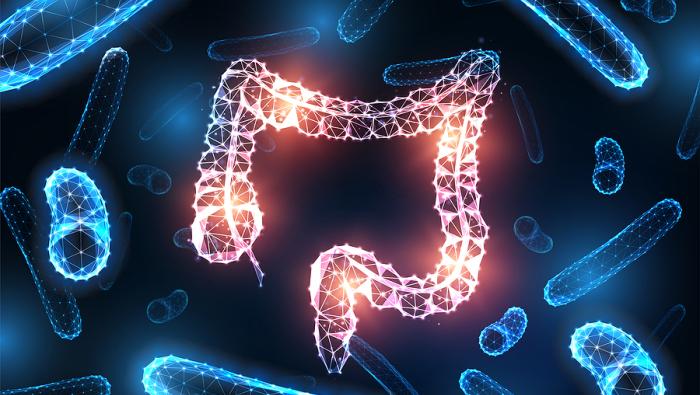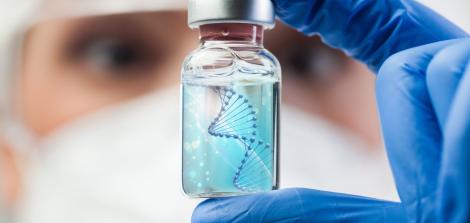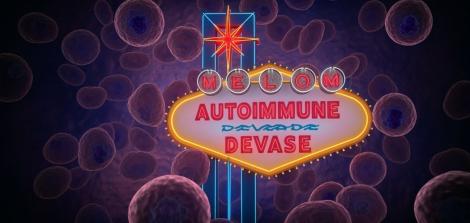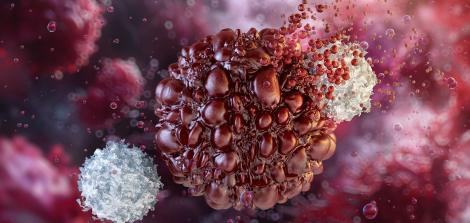How will gut bacteria change the pharmaceutical world? | An interview with Dr. Nissan Yissachar

Dr. Nissan Yissachar from the Institute of Nanotechnology and Advanced Materials at Bar-Ilan University became a researcher by sheer chance. When asked as a child or teenager, “What do you want to be when you grow up?” His answer included neither the word ‘scientist’ nor ‘researcher’. Not only that, during his military service he specialized in computers and after his release from the army he even began working in the high-tech industry.
How did Dr. Yissachar end up heading a leading laboratory at the Bar-Ilan University Faculty of Life Sciences? It's a love story. When Dr. Yissachar's partner – and later his wife and the mother of his children – decided to start her studies for a Bachelor’s Degree in biology at Bar-Ilan University, Dr. Yissachar felt that he had to join her. This soon became a professional love story, which drove Dr. Yissachar to stay at the university and complete his Master's Degree and Third Degree in molecular biology.
Despite his tight schedule, between writing an article about laboratory results and mentoring students, Dr. Yissachar told us about the impressive innovations in the field of gut bacteria research, about how thin and fat mice may change the treatment of autoimmune diseases, and what the difference is between Harvard University- where he completed his post-doctorate- and Bar-Ilan University.
How are decisions made by a swarm of bees?
It has been known to the scientific community for 400 years that humans carry and contain billions of microorganisms. The digestive system is no exception - it is made up of billions of gut bacteria and single-celled creatures, called the "gut microbiome". Although this knowledge is hundreds of years old, it is only in the last two decades that microbiome research has begun to drive multiple applicable scientific breakthroughs.
Dr. Yissachar, what happened in the past two decades that did not happen in the last 400 years?
"Knowledge did indeed exist for centuries – but the tools to explore this knowledge did not. To study bacteria, we are required to grow them in a laboratory and to manipulate them. In the past most of the bacteria in the digestive system could not be grown in the laboratory – so it was impossible to study them. But everything changed about 15 years ago when new technologies were developed to facilitate a wide variety of actions."
What actions, for example?
"The technologies developed in recent years allow us to sequence DNA, that is, to "read” our genetic material and understand the composed of human beings. This process was expensive and cumbersome for a long time, but all that has changed, and today this process is much cheaper and faster. Rapid technological advances in this field make it possible to take an actual sample of intestinal bacteria in order to sequence that bacteria’s DNA -rather than growing them in a laboratory and manipulating them –and thus, dramatically shorten the amount of time necessary to receive a huge amount of information."
And what does the information from DNA sequencing give you as a researcher?
“When I compare the information I receive to existing databases, I can learn a lot about a person's bacteria; which bacteria are present and which are missing, or how the food that person consumes affects their digestive system. For example, if you switch to a vegan diet it will have an immediate impact on your digestive system- and not just vegan. But it doesn’t come down only to that: the bacteria of a person from the West is different from that of a person from the East. The research in our laboratory focuses on the connection between the immune system and the gut microbiome, in order to understand how this connection affects decisions made by the immune system."
Our immune system makes decisions?
“Yes. Our immune system is made up of a very, very large number of cells. The activity of a single cell does not have a sufficient effect on its own; in order to drive the immune system to start a process that will have a significant result, any cell that identifies a need must harness all the cells in its environment or replicate itself. Imagine a swarm of bees: How does the swarm of bees decide to fly right or left? After all, it isn’t like a single bee decides which direction to go and all the others just follow; there is some mechanism that enables the swarm to make decisions. The same applies to the immune system: We’re researching how those billions of cells make decisions.”
Why is it important to understand the decision-making process? After all, the result makes all the difference.
"First of all, sometimes the wrong decisions are made. For example, in many cases of cancer, cancer cells have various ways to evade the immune system, and as a consequence the immune system does not consider them to be harmful and actually “allows” them to multiply. If we better understand how the immune system makes its decisions, this will allow us to understand how cancer cells evade it, and what can be done to fix this. The same thing applies to the opposite scenario: In the case of autoimmune diseases such as lupus or inflammatory diseases – such as Crohn's disease or colitis where the immune system mistakenly decides to attack healthy cells – in such cases we would like to calm the immune system.”
How are such situations handled today?
“In the case of autoimmune diseases, drugs are administered to suppress the entire immune system – and it actually works. But this means that the drug “unplugs” and suppresses the entire system, and this affects the way the body handles other threats. Understanding how the immune system makes decisions will allow to target and influence particular decision-making steps, without “weakening” the system altogether. Moreover, this will enable us to render personalized medical services, so that two Crohn's patients will receive two different drugs given the differences between the ways their immune systems operate.”
Can microbiome research provide an answer to multiple sclerosis and cancer?
Do your scientific insights about the relationship between the microbiome and the immune system already have practical applications?
“Yes. For example, in a study we conducted together with a group of researchers from Germany, we discovered a mechanism that maintains a neurological-immune dialog: We discovered that the nervous system was the first to respond to our gut bacteria. In other words, certain gut bacteria can affect our neurological response, that is, the secretion of different substances at different amounts. These substances, in turn, increase or decrease inflammation.”
Does this mean that with the help of certain gut bacteria it will be possible to control or reduce inflammation?
"Exactly. The mechanism we discovered is very relevant to brain inflammation or encephalitis. We discovered that when we introduce a certain substance produced by gut bacteria to patients with multiple sclerosis, it increases their anti-inflammatory response and reduces the inflammation in their brain. I will not go into the entire biochemical mechanism, but in a nutshell, this involves a short fatty acid naturally produced by gut bacteria, which was found to cause fewer seizures and drastically reduce inflammation in the brain when given at a certain dose to MS patients. This means that multiple sclerosis, which is an incurable disease, could become, so we hope, a chronic condition in the future.”
That's dramatic. And what about other incurable diseases, like certain types of cancer?
"Currently, there are two ways to treat this disease: One is chemotherapy. This treatment stops the multiplication of cancer cells, but also that of healthy cells, and therefore has severe side effects. The second way is immunotherapy. It drives the immune system to act against cancer cells and stop them from multiplying without harming healthy cells."
What does immunotherapy have to do with your research?
“Gastrointestinal bacteria have an effect on both the development of cancerous tumors as well as the patient's response to anti-cancer treatment. Immunotherapy works well only for a few cancer types and for a small number of patients, and one of the challenges any attending physician has is figuring out when immunotherapy may or may not work. Studies show that the gut bacteria will affect whether a patient will respond or not to immunotherapy. This discovery has far-reaching implications, and I hope that soon we will be able to implant the 'correct' bacteria – such that respond to the beneficial treatment – in patients who do not respond to treatment this will introduce additional immunotherapeutic solutions for many patients who currently do not benefit from immunotherapy.”
Non-irritable bowel: How not to unplug the system
As we can already understand, Dr. Nissan Yissachar's research findings have the potential of changing the field of medicine as we know it today. For example, instead of a "general" drug sold to everyone, we may one day be able to manufacture a personalized drug tailored to the patient and their disease. Indeed, hospitals such as Tel Hashomer and Kaplan turn to Dr. Yissachar's laboratory, where the various teams try to connect theory with practice, and the needs from the field with laboratory research.
How did the collaboration with Kaplan Hospital come to be?
“A senior physician from Kaplan Hospital contacted our laboratory because he was interested in investigating patients suffering from irritable bowel disease, which causes constipation or diarrhea, abdominal pain and abdominal swelling. There is a very strict dietary regime for these patients called low FODMAP, which alleviates symptoms in 70% of the cases. So what's the problem? It is impossible to maintain it for long because it is very demanding and strict. That physician turned to me and said he would be interesting to see if a comparison of gut bacteria between patients who maintain this diet and those who don’t could teach us anything, and the results were amazing.”
What did you discover?
“The study showed that all patients in the trial had a bacterium that was found to damage the intestinal mucosa. We also found that this bacterium feeds on the fructose found in certain fruits – exactly the same fruits that are avoided in this diet. Further research will indicate if we can replace this strict diet with merely avoiding the specific fruits that provide that bacterium with fructose, thereby experiencing the same relief offered by that strict diet with a much simpler and easier diet that can be maintained over time.”
A fat mouse, a thin mouse and the way the fetus comes into the world
The consensus in the scientific community is that in the mother's womb, the fetus is in a completely sterile environment. This changes at birth, when the fetus first receives its first microbiome. Naturally, the way the fetus is born – through the birth canal or by cesarean section – has a big impact on the composition of the microbiome. The birth canal, for example, contains the mother’s bacteria such as her intestinal bacteria, whereas birth by cesarean section involves exposure to different bacteria – those on the mother’s skin or bacteria found in the hospital.
Does our birth determine our bacterial composition and does this affect us for the rest of our lives?
"Good question. What we know today is that babies born via cesarean section are more likely to develop diseases like asthma, allergies, and various autoimmune diseases. In the past, the hypothesis was that these diseases were caused because the immune system did not receive the 'right' bacteria at birth. Is this correct? We don't know. So just to get a better understanding of this relationship, we started investigating this.”
How do you study the bacteria of fetuses or newborn babies?
“The experiments are not conducted on humans but rather on mouse fetuses. We introduced into the intestines of certain mouse fetuses intestinal bacteria from babies born both by cesarean section and through the birth canal. We found that the intestines that received bacteria from babies born via the birth canal are able to better communicate with the immune system and are less inflammatory than the intestines that received bacteria from babies born via a cesarean section. To understand the long-term effects, we are continuing this investigation over time. ”
What else can gut bacteria affect?
"Our weight. For example, in a study from Professor Jeffrey Gordon's laboratory in the United States, intestinal bacteria were taken from obese and non-obese people, and transplanted in mice. The result was that the mice became either fatter or thinner based on the bacteria they had received. By the way, Prof. Omry Koren from the Faculty of Medicine at Bar-Ilan University showed that the same thing happened in response to women's gut bacteria taken at the beginning and the end of their pregnancy. Mice that had received intestinal bacteria from women at the beginning of pregnancy maintained the same weight. On the other hand, mice that had received intestinal bacteria from women at the end of their pregnancy gained weight. In other words, the research of the gut microbiome may potentially lead to a solution to obesity- by means of fecal transplantation, for example."
A lot has changed since you left: From Harvard to Bar-Ilan
One of the things that distinguish Dr. Yissachar's laboratory is the diversity of the team members’ fields of expertise. In his laboratory you can find researchers specializing in neurobiology, microscopy, genomics and molecular biology. It turns out that this diversity was one of the main factors that drove him to return from one of the world's most prestigious universities, Harvard, to the university where he grew up.
From Harvard to Bar-Ilan - why?
“Other than the fact that this is my home, and where I received all my degrees, I love Bar-Ilan because it's a diverse university. You have everything here. This is reflected both in the expertise of the staff in my laboratory and in the human capital itself, which is a mosaic that reflects Israeli society. This diversity, in my opinion, also has implications for laboratory research. Our well-rooted belief as researchers is that we don't always have all the answers. I don't know everything, and it's very helpful to look at the same problem from different angles.”
What has changed at Bar-Ilan University since you left?
"Everything has changed: Staff members, equipment, buildings, budgets, laboratories. The direct result of these changes is that our research laboratories do not fall below those of leading faculties in Israel and around the world. Beyond that, at the Faculty of Life Sciences, where my laboratory is located, it really feels like family. I felt this as a student and I feel this today as a faculty member as well. ”
Still, what's the difference between Harvard and Bar-Ilan?
"There are some differences; generally speaking: the research team in the US laboratory comprises postdoctoral students, and here in Israel most of the researchers in the laboratories are studying for their second and third degree. A postdoctoral student brings with them substantial experience and maturity. A Master’s Degree student has no experience and requires a lot of attention, but on the other hand they are also able to shake up the system, challenge rooted approaches that those with experience would not think of challenging, and stand out for their creativity and innovative ideas."
A new therapeutic world: Personalized medications for each patient
So when will we see personalized drugs on the market?
"When the drugs will be available on the shelves is something I cannot foresee. Despite the mind-blowing discoveries in the pharmaceutical world, this field is still taking its baby steps. However, you do see the beginning. For example, the FDA has recently approved fecal transplantation in people with a specific infectious disease (clostridium difficile infection): You can give a capsule with frozen feces to a particular patient, and the next day they are healed. I believe that in 10-15 years the ability to give patients a personalized drug for the specific disease they have will be almost within our reach."
Isn’t this the kind of personalized medicine that you can also develop with the help of DNA editing?
“There is a huge difference between genetic editing and microbiome-based treatment. The difference lies in the fact that genetic editing isn’t a simple process. Investigating our bodies’ basic or core mechanisms is very delicate, complicated and irreversible. However, modifying or engineering the composition of gut bacteria is much less dangerous, it can be changed and has no irreversible consequences. This is exactly what is so special about this mechanism: It has been known to us for 400 years, and in recent years technology and science have enabled us to harness it to make dramatic and unprecedented changes in the field of medicine with a very low risk.”
Last Updated Date : 12/11/2024








